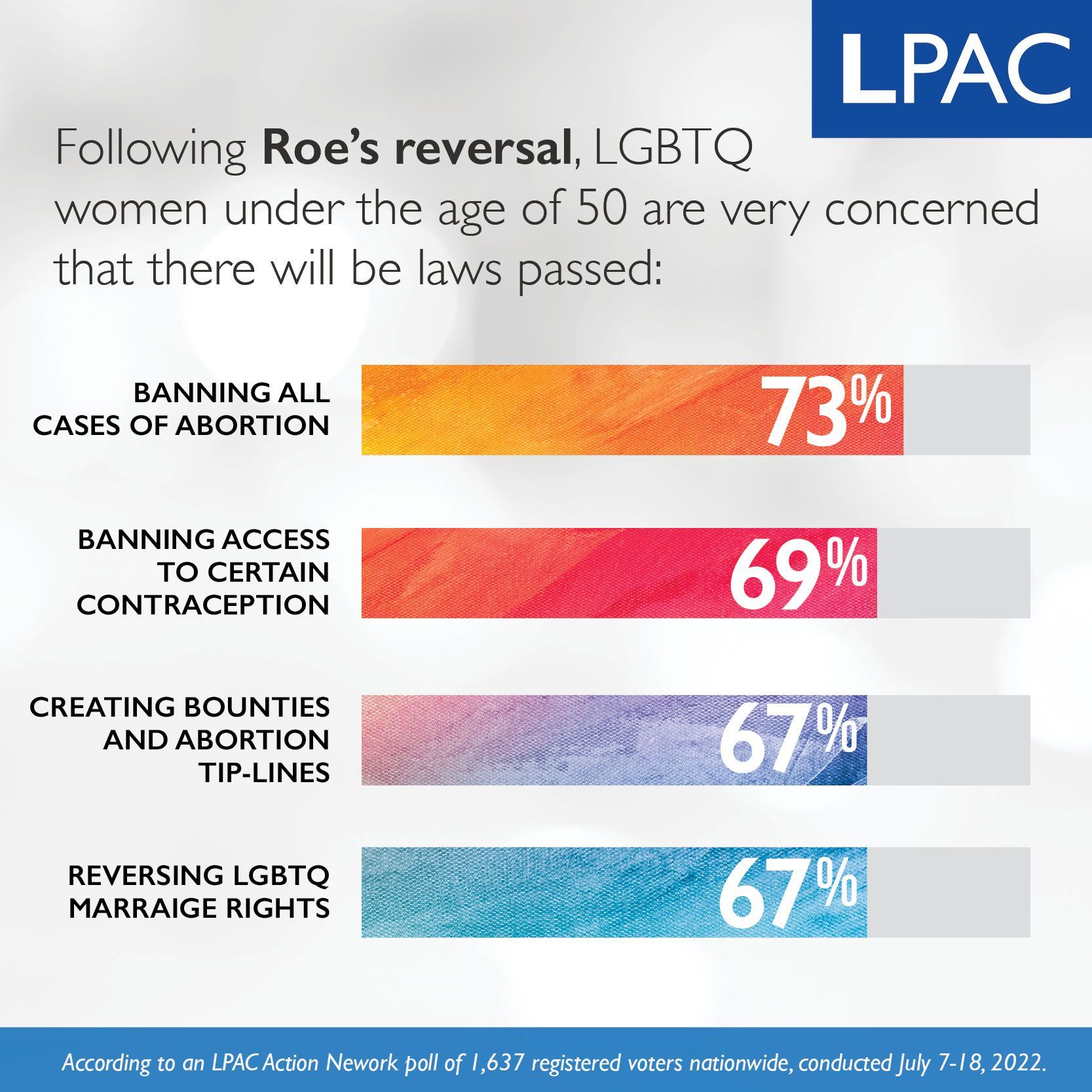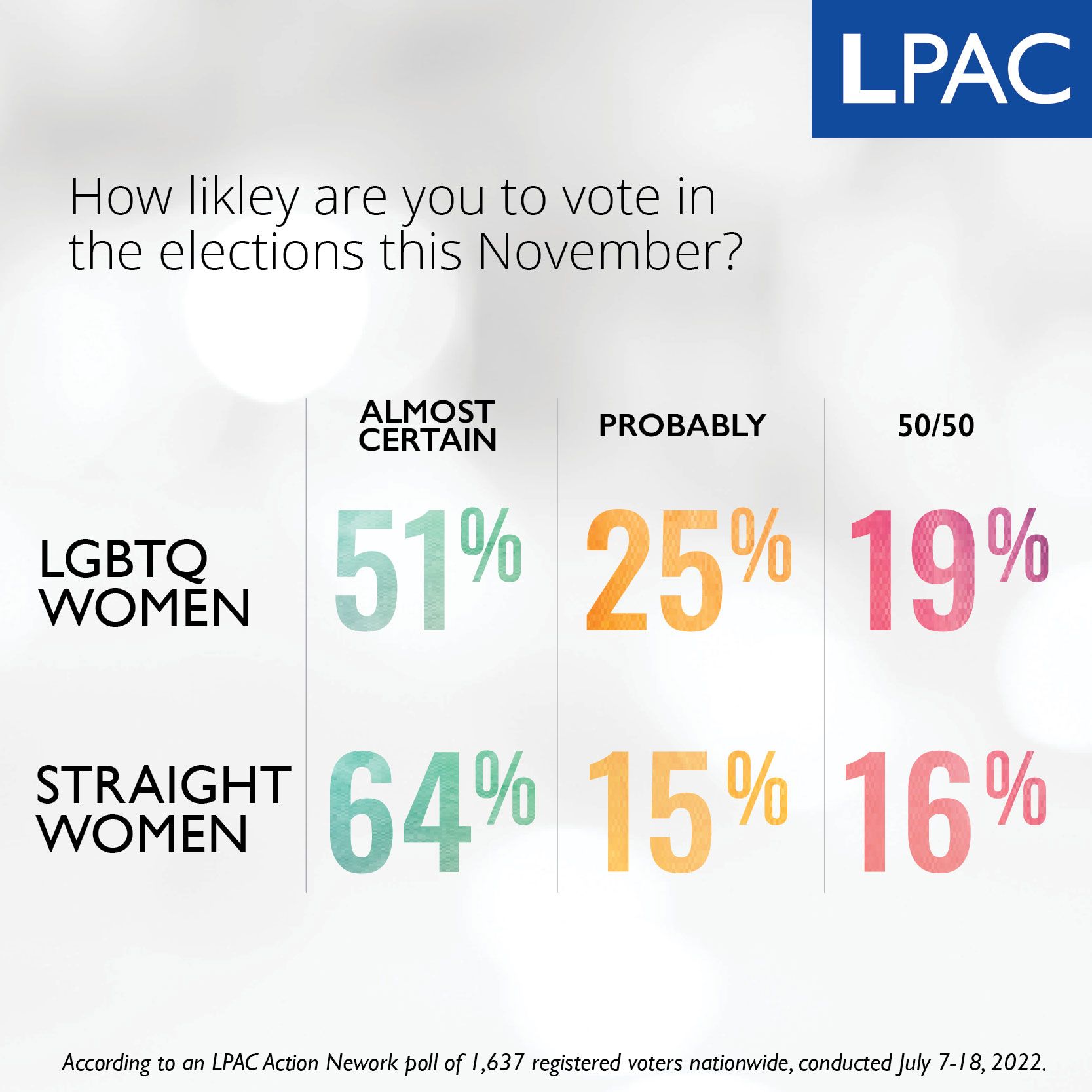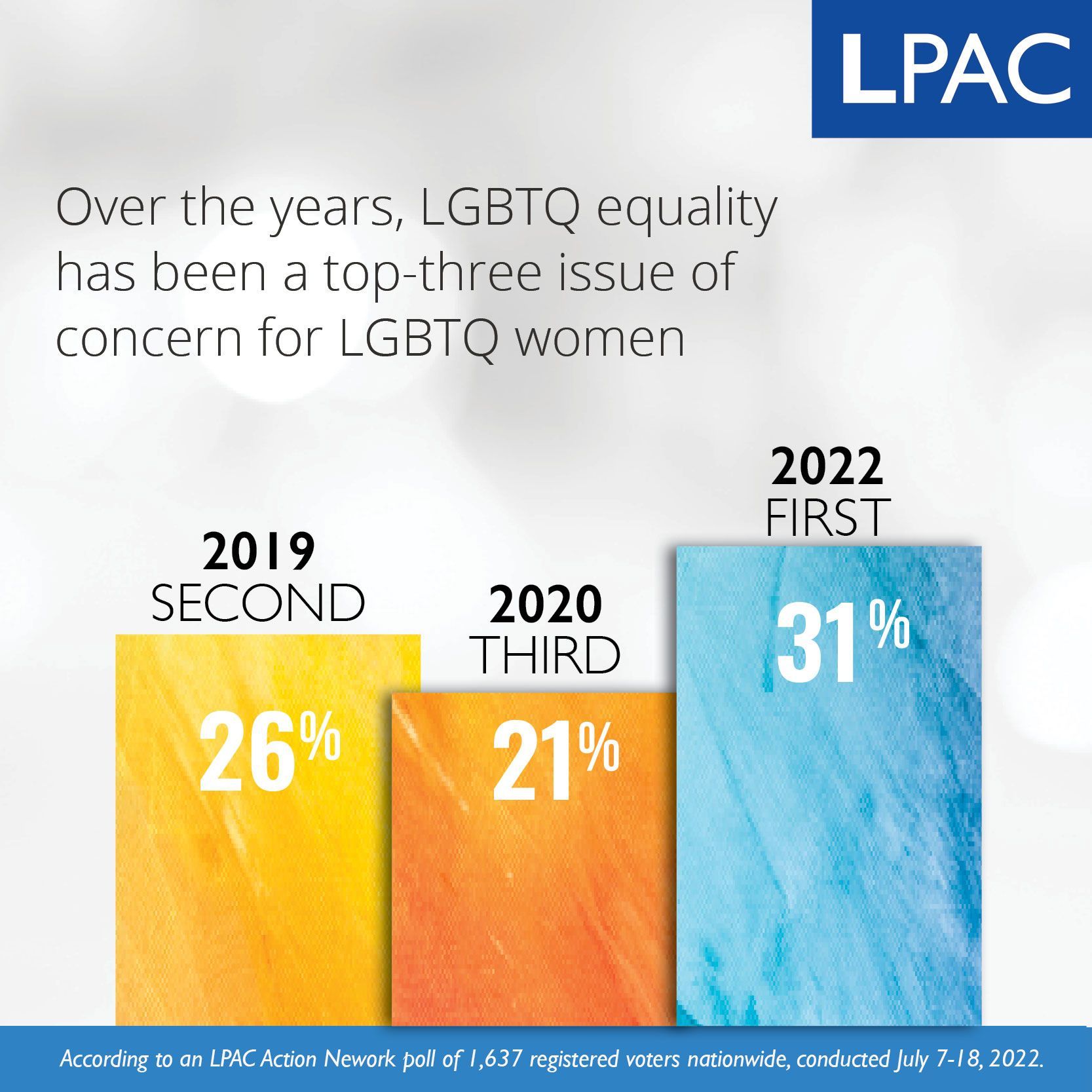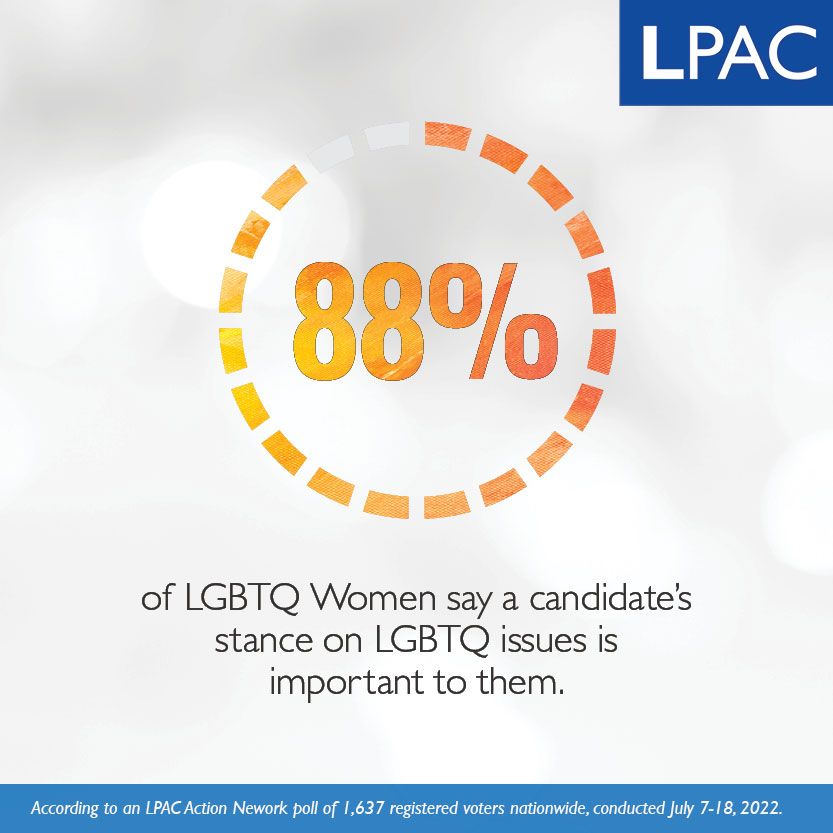LGBTQ Women as Voters After Roe and Ahead of 2022 Midterm Elections
In 2022, with the end of Roe v. Wade and an avalanche of anti-LGBTQ legislation introduced across the country, the rights of LGBTQ women were under direct threat. It is imperative to understand how this environment impacted LGBTQ women’s civic participation in advance of the major 2022 Midterm Elections.
In July 2022, Project LPAC and LRP are fielded a nationwide poll on LGBTQ women’s political participation and attitudes on current issues facing the country. It delved into motivations of LGBTQ women compared to straight women and opportunities for messaging to maximize electoral participation
.
The poll consists of a 13-minute nationwide survey reaching 1,500 registered voters. Survey samples included a base of 800 LGBTQ women and oversamples of LGBTQ women of color, transgender women and nonbinary people, straight women, and straight women of color.

Slide title
Write your caption hereButton
Slide title
Write your caption hereButton
Slide title
Write your caption hereButton
Slide title
Write your caption hereButton
Key Research Findings:
LGBTQ+ Women Follow and Are Impacted by Many Issues:
- Top concerns: 31% of LGBTQ+ Women said LGBTQ+ equality and abortion access were their top concerns
- Over 50% of LGBTQ women are concerned with outcomes from the overturning of Roe, such as banning contraception (59%) and banning interracial marriage (55%)
- LGBTQ women, especially younger LGBTQ women, are intensely concerned about both abortion and LGBTQ rights and are hyper-aware of how the two issues are linked. In the wake of Roe being overturned over half of all LGBTQ women are very concerned about all potential outcomes we tested – a very high level of acute concern. The top concerns:
- 64% of LGBTQ women are very concerned that all abortion will be banned, including in cases of rape, incest, or risk to the mother’s life.
- 62% are very concerned that LGBTQ marriage will be banned.
- 61% are very concerned that same-sex intimacy will be criminalized.
- 61% are very concerned that nondiscrimination protections in housing, employment, and public accommodations will be overturned.
- LGBTQ women’s key issues translate to the most important traits they consider when deciding for whom to vote for in Congressional and Senate races:
- The most-important trait LGBTQ women look for when deliberating whom to vote for is a candidate who stands up for LGBTQ rights.
- LGBTQ women say a candidate who can get things done and bring about change is also important, and these are the most-important traits straight women look for.
- A candidate’s stances on key issues also factor prominently. LGBTQ women say it is important that a candidate address gun violence and support abortion.
LGBTQ+ Women’s Voting Trends
- In Congressional elections, LGBTQ women vote Democratic by a significantly larger margin than straight women. Their choice is influenced by how candidates address LGBTQ-specific issues, which some parties rarely address.
- 88% of queer women said that in federal elections, a candidate’s stance on LGBTQ issues was important (only 49% of straight women felt the same way)
- 56% of LGBTQ women voters trusted Democrats to better handle LGBTQ issues than Republicans
- Straight women exhibited higher voter turnout rates than LGBTQ women in the 2022 midterm elections.
- 60% of surveyed straight women voted in local & state elections, and 56% voted in federal elections. Only 45% and 42% of their LGBTQ counterparts also voted in those elections
- LGBTQ women are more politically engaged than their straight counterparts. Some popular avenues of engagement include sharing their opinions on social media, signing petitions, and donating to causes they support. They are steadfast political advocates for their beliefs
- Yet voting, the most well-known method of political participation, takes a backseat with this demographic.
- Similarly, LGBTQ women are less likely than straight women to say they are almost certain to vote in future elections. There is significant opportunity in making sure those who report they will “probably” vote cast a ballot.
- 75% of LGBTQ women are likely to vote, of those 51% say they are almost certain to vote.
- Younger LGBTQ women (under the age of 50) are more likely than older LGBTQ women to say they are almost certain to vote – 55% to 42%.
- 78% of straight women are likely to vote, of those 64% say they are almost certain to vote. 15% will probably vote.
Common Sentiments Among Surveyed LGBTQ Women Less Motivated to Vote:
- LGBTQ women who are less prone to vote want more information about candidates and how they stands on issues voters find important
- Many believe America’s political system is rigged, and that their vote doesn’t matter
- Political Strategist Celinda Lake: “[LGBTQ women have] a very specific agenda; it is very policy-related…[which] is not surprising, given that [they] are really focused on…and active on issues…[But] this is not the agenda that we tend to see in GOTV messaging. And it’s no wonder that LGBTQ women are less motivated [to vote] and saying they’re not hearing about the things that matter to them.”
- To better harness the support of LGBTQ women, candidates (especially at the state and local levels) need to address issues LGBTQ women care about, such as abortion rights/Roe v. Wade’s overturning, gun violence, and LGBTQ+ rights. They also need to work against the pervasive political cynicism among LGBTQ women.
- Political Strategist Celinda Lake: “Cynicism [is our biggest enemy]…and we need to demonstrate to LGBTQ women that there are places where their vote has made the difference.”
Why Project
LPAC
Women – LGBTQ women in particular – are underrepresented at the highest levels of government. There are currently four LGBTQ women in Congress. While this is a record, it’s still less than 1 percent of all federal legislators, well below proportional representation. The situation is even worse in the other branches of government: an openly LGBTQ woman has never served in the Cabinet or on the Supreme Court.
In recent years there has not been comprehensive research specifically exploring LGBTQ women as a political community. Given their lack of representation in government, it is especially important to understand this community’s connection to electoral politics to help policymakers, candidates, and organizations which aim to represent and advocate for women and other marginalized communities do so more thoroughly and inclusively.
Project LPAC is a fiscally sponsored project of Social Good Fund, a California nonprofit corporation and registered 501(c)(3) organization, Tax ID (EIN) 46-1323531.
Project LPAC | All Rights Reserved |
Created by Olive + Ash.
Managed by Olive Street Design.

